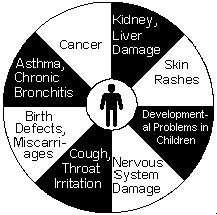The toxic effects are making themselves known on people living in cities on the mainland U.S. and on Gulf shellfish miles from the site of the BP oil spill. The evaporating oil slick, which is itself the major source of deadly aromatic hydrocarbon emissions, will continue spreading for months after the gusher is plugged, according to scientists.

While BP is expected to finally plug the Deep Horizon well as soon as next week to great fanfare, the toxic effects will continue for months and years to come.
OP:
http://www.envirotech-online.com/news/air-monitoring/6/breaking_news/bp_spill_having_effect_on_us_air_quality/11017/ - BP spill 'having effect on US air quality'
The BP oil spill has had a negative effect on the air quality of US cities, a report has shown.
Scientists at the National Oceanic and Atmospheric Administration (NOAA) released details of their research into the air quality of states close to the Gulf of Mexico explosion that occurred on April 20th.
They revealed that 15 to 17 kilometres downwind from the location of the spill, there were concentrations of chemicals in the air that were much higher than should be expected in urban areas.
The health effects of aromatic hydrocarbon emissions from oil slicks, such as benzene and other known carcinogens, are well understood.

http://www.exponent.com/petroleum_hydrocarbons/ The petroleum constituents of primary interest to human health have been the aromatic hydrocarbons (i.e., benzene, ethylbenzene, toluene, and xylenes), polynuclear aromatic hydrocarbons (PAHs), gasoline additives (e.g., MTBE, TBA), and combustion emissions from fuels (e.g., carbon monoxide, benzene, acetaldehyde, formaldehyde, diesel particulates).
Aromatic Hydrocarbons and Polynuclear Aromatic Hydrocarbons (PAH)
The aromatic hydrocarbons are identified as chemicals of interest for health risk assessments at most petroleum-contaminated sites and for sites affected by petroleum solvent. Benzene is the only aromatic hydrocarbon classified by the U.S. Environmental Protection Agency and other health and environmental agencies as a �known human carcinogen,� and therefore, is the primary focus of many petroleum hydrocarbon risk assessments. Exponent has conducted hundreds of site risk assessments where benzene was a chemical of concern. The potential exposure to benzene at a petroleum-contaminated site depends on the concentrations of benzene in the soil, water, and air, and the frequency and duration of expected human contact with the contaminated media. If the petroleum release was gasoline from an underground tank, benzene will likely be found in soils and possibly also in shallow groundwater and air. The volatilization of benzene in subsurface soils and shallow groundwater and its migration into buildings (vapor intrusion), have recently become a risk assessment focus that has led to the reopening of Records of Decision (RODs) at a number of sites. Benzene and the other aromatic hydrocarbons are taken up through the skin, lung, and digestive system, so all three routes of exposure (dermal uptake, inhalation, and incidental ingestion) need to be considered in assessing health risks.
The BP spill also has lasting effects on the Gulf food chain, as well. PAH residues have been previously observed in mussels in shallow sedimentary layers more than 15 kms from the source:
http://linkinghub.elsevier.com/retrieve/pii/0048969779900184 Polycyclic aromatic hydrocarbons (PAH) have been determined, by glass capillary gas chromatography, in two species of bivalves (Mytilus edulis and Modiolus modiolus) and sediments of Saudafjorden, Norway. The PAH observed are derived from waste effluents from a ferro alloy smelter. Up to 34 PAH compounds were identified, including some reported to be carcinogenic. The concentrations decreased rapidly with distance from the source and with sediment depth, but could be traced more than 15 km from the source.